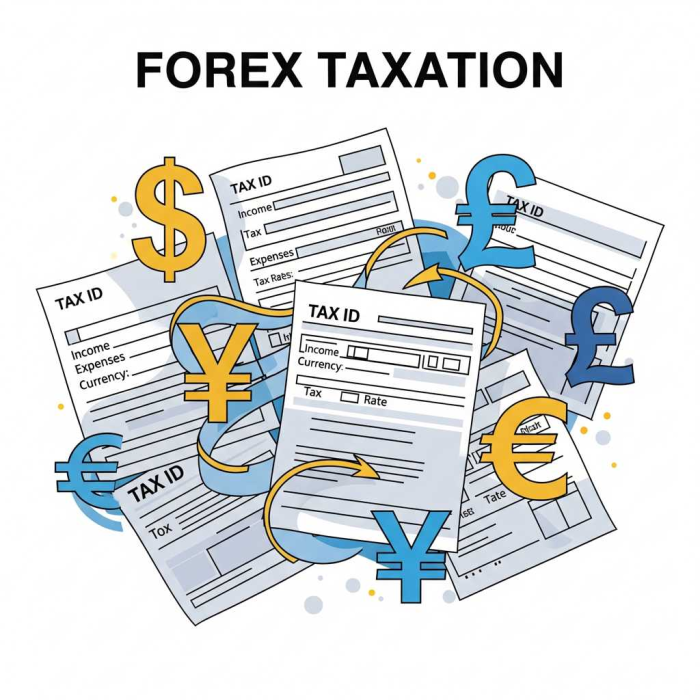Unraveling the Tax Maze | What Every Forex Trader Needs to Know
Forex trading, with its allure of rapid gains and global markets, has captivated countless individuals. However, as with any income-generating activity, the taxman eventually comes calling. Understanding forex taxation isn't just about compliance; it's about optimizing your trading strategy and avoiding unwelcome surprises.
The world of forex taxation is far from a one-size-fits-all scenario. Rules vary significantly from country to country, and even within a single jurisdiction, the tax treatment can depend on factors like your trading volume, the type of instruments you use, and whether your trading is considered a "hobby" or a "business."

The Core Concepts: Income vs. Capital Gains
At the heart of forex taxation are two primary categories:
- Income Tax: If your forex trading is deemed a regular, primary source of income or a business activity, your profits will likely be taxed as ordinary income, subject to your country's standard income tax rates. This often applies to professional traders or those with high trading frequency and volume.
- Capital Gains Tax: For many casual or hobby traders, forex profits are treated as capital gains, taxed on the appreciation of the currency pairs you trade. Capital gains tax rates can often be lower than ordinary income tax rates, especially for long-term gains (though holding periods in forex are often short).
The Nuances: Beyond the Basics
Here's where it gets interesting, with variations that can significantly impact your tax bill:
- Section 1256 Contracts (U.S.): In the United States, certain forex contracts, like futures and options, fall under IRC Section 1256. This offers a favorable 60/40 tax treatment: 60% of gains or losses are considered long-term capital gains/losses, and 40% are short-term. This can be highly beneficial for traders in higher income brackets, as long-term capital gains often have a lower tax rate.
- Section 988 Contracts (U.S.): Most spot forex traders in the U.S. are generally taxed under IRC Section 988, where gains and losses are treated as ordinary income or loss. A key benefit of Section 988 for those experiencing net losses is the ability to deduct all losses as ordinary losses, rather than being limited to the $3,000 capital loss deduction typically applied to other investments. However, traders can sometimes elect to treat major currency pair trades under Section 1256.
- Spread Betting (UK): In the UK, spread betting on forex is uniquely classified as gambling, making any profits tax-free from Capital Gains Tax and Stamp Duty. This makes it a popular choice for UK residents.
- CFDs (UK): While Contracts for Difference (CFDs) in the UK don't incur Stamp Duty, profits are generally subject to Capital Gains Tax. However, a significant advantage is the ability to offset losses against profits.
- Business vs. Investor Status: The distinction between an "investor" and a "trader" is crucial in many countries. A full-time, self-employed forex trader might be able to deduct business expenses (trading software, internet, education), whereas a casual investor typically cannot.
- Loss Offsetting: Understanding how you can offset losses against gains is vital for minimizing your tax liability. Some jurisdictions allow full offsetting of trading losses against trading gains, while others may have limitations or specific rules.
- Record Keeping is King: Regardless of your location or trading style, meticulous record-keeping is non-negotiable. You'll need to track every trade, including dates, currency pairs, entry/exit prices, and the resulting gain or loss. This information is essential for accurate tax reporting.
International Considerations
For those trading across borders or with international brokers, the complexities multiply:
- Residence for Tax Purposes: Your tax obligations are primarily determined by your country of tax residence.
- Double Taxation Treaties: Many countries have tax treaties in place to prevent individuals from being taxed twice on the same income. Understanding these can be crucial if you're trading internationally.
- Reporting Foreign Income: If you're earning profits from offshore accounts or platforms, you are generally obligated to report this income to your home country's tax authorities.
Key Takeaways for Forex Traders:
- Know Your Jurisdiction: Research the specific forex tax laws in your country of residence. Don't assume.
- Understand Your Trading Status: Are you a casual investor or a professional trader in the eyes of your tax authority? This impacts how your profits are taxed and what deductions you can claim.
- Keep Impeccable Records: This cannot be stressed enough. Detailed records of every trade are your best friend come tax time.
- Consider the Trading Instrument: The type of forex instrument you trade (spot, futures, options, CFDs, spread bets) can have different tax implications.
- Consult a Tax Professional: Given the nuances and potential complexities of forex taxation, especially for significant trading activity, seeking advice from a tax professional specializing in trading is highly recommended. They can help you navigate the rules, ensure compliance, and potentially identify opportunities for tax optimization.
Ignoring forex taxation is a risky game that can lead to penalties and legal issues. By proactively understanding your obligations and maintaining diligent records, you can trade with greater confidence and ensure your hard-earned profits remain yours.
Popular Tags